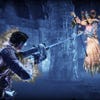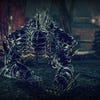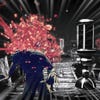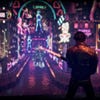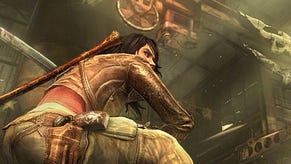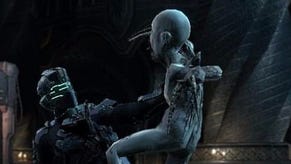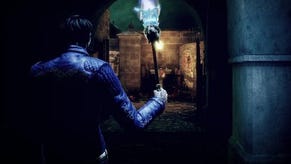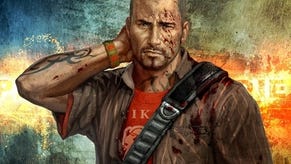Shadows of the Damned
Taking the Mikami.
Mikami's contribution is clearly the gunplay, which is tight and satisfying, bearing the hallmarks of his work. It lifts Resident Evil 4's over-the-shoulder viewpoint with a lock-to-aim trigger squeeze. But there are no pondering animations here to slow the pace, and it's a simple button-press to snap into a 180-degree turn while aiming down the barrel of your weapon.
However, while character control is comparably tight, Shadows of the Damned is a far looser and ropier experience than Resident Evil 4 when it comes to the fights themselves. Decapitating an enemy with a headshot is accompanied by a lingering slow-motion camera, but these skittish enemies are far less satisfying to extinguish than Los Ganados, and the giant, glowing red weak spots on each and every boss lack the elegance of Mikami's more solemn output.
Each gun can deploy a 'light shot' as well as standard fire, a type of ammunition that will momentarily freeze enemies as well as dispelling darkness if used to light up one of the goat-head street lamps. Darkness damages Hotspur, so is used to construct a series of puzzles, many of which must be solved while battling enemies. The satisfying rhythm of upgrading weaponry (improving power, reload times and capacity) is heightened by more substantial visual upgrades that occur when you defeat key bosses and, by the end of the game, you are starting to feel like the badass Hotspur so readily professes to be.
But the graceless enemy animations and their repetitious designs are among the things holding this game back from being the triumph it could have been. Likewise, the lock-and-key puzzles soon lose their freshness, especially as the stream of new mechanics and ideas slows to a trickle in the second half of the game. There are only so many times you can hunt out a strawberry to feed to a lock, or laboriously shoot and explode sticky bombs around the edges of a fractured wall in order to progress.
Although the game's components fail to inspire in isolation, together they provide a breezy, enjoyable ride. There's just enough variety on offer to keep you driving forward, and the snack-sized chapters make the game difficult to put down. As with all of Suda's games, the wilful absurdity sometimes reeks of trying too hard - while the use of various types of hard liquor as health items is plainly trying too hard - but there's just enough gold amongst the chaff to make the farce believable, and ensure the game can appeal to a wider audience than tittering schoolboys.
For example, there's Christopher, a hulking demon with two rows of razor teeth and a camp redneck accent, from whom you can purchase ammo or weapon upgrade crystals. Or there are the firework stations into which you thrust your Johnson torch in order to light up the sky and ward off the sapping darkness. There are the yakety-sax sections where you're chased at high speed by a zombified version of the girl you're trying to save. And there's the pot-bellied demon boss that incessantly screams 'f***********k yoooooou' as a battle cry before turning into a giant eagle and shooting feather daggers at you.
These ideas are one-offs. They haven't been plundered from a rival series, and they won't be making an appearance in any other EA titles scheduled this year. Uniqueness alone isn't cause for celebration - but when combined with competence and the odd flash of inspiration, it can make up for other shortfalls.
Shadows of the Damned lacks the polish of Mikami's Capcom work, showing a rough edge that its creators no doubt hope communicates their punk attitude to game development, but really just comes across as a bit shoddy. But at a time when few publishers of EA's stature are willing to take genuine risks, its uniqueness is welcome and interesting. And as a celebration of the puerile, it leaves Duke Nukem Forever standing, staring longingly at its tit bridge.

